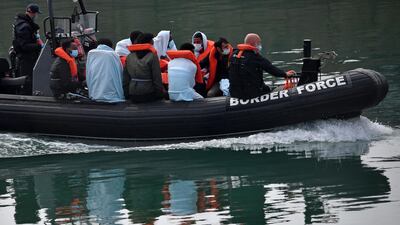The UN said it would examine British plans to overhaul its system for handling migrants and reduce the ways people can claim asylum.
Officials at the UN High Commission for Refugees said the UK planned a “host of complex changes” but there was “a universal right to seek asylum”.
Britain wants to reduce the ways people can claim asylum and only give temporary permits to migrants who arrive in the UK from safe nations.
The plan announced by the Home Secretary, Priti Patel, would only allow permanent permission to remain in the UK if the applicant went through official channels, such as those set up in refugee camps.
Others, such as those who arrive in southern England after crossing the Channel from northern France, would only be eligible for "temporary protection status", under which they would be reassessed for removal at a future date.
Matthew Saltmarsh, senior external relations officer at the UNHCR, said some claimants had “very legitimate reasons” to seek protection in specific countries, such as family ties.
Mr Saltmarsh said the British effort could affect the international protection system for refugees and that “there are rights and obligations for states and individuals”.
He said the 1951 Refugee Convention did not provide “unfettered right to choose a country of asylum” but it also did not “oblige asylum seekers to apply in the first safe country they encounter”.
Plans to send some migrants outside the UK were also criticised.
“Externalisation arrangements often run counter to the spirit of international solidarity and burden-sharing,” Mr Saltmarsh said.
“They risk a gradual erosion of the international protection system, which has withstood the test of time and which we have a collective responsibility to safeguard.”
Ms Patel said the proposed system rewarded those who came through legal routes, such as the UNHCR, and discouraged those travelling through safe countries.
She said the UK would create "safe and legal routes" for asylum seekers to go to the UK.
More than 100 migrants, including a young girl, crossed the Channel on Tuesday, adding to the 806 who have arrived on small boats this year.
A record 8,400 asylum seekers tried to cross the English Channel last year.
Since January, the government has been trying to pass laws to give British border police more power to obtain fingerprints from migrants trying to cross the Channel.


